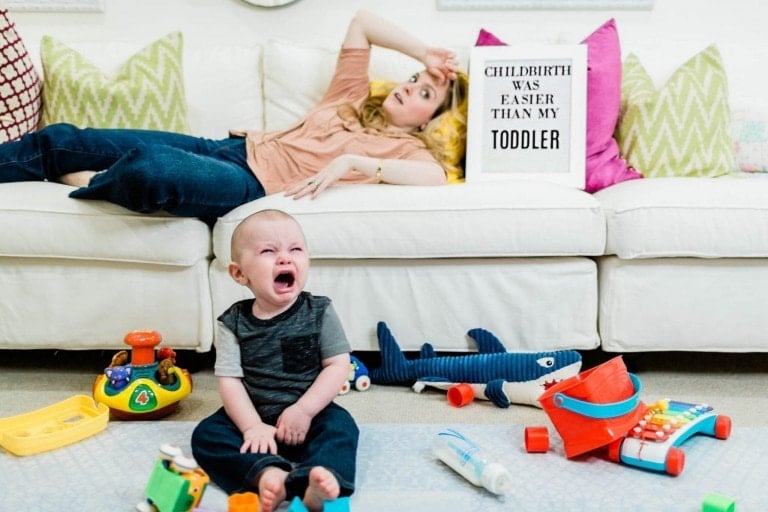Tantrums: A spectacular loss of control and disorganized behavior. They come in all shapes and sizes but are generally an expression of frustration and anger. You might see these behaviors during a tantrum: kicking, shouting, flopping (or throwing) themselves to the ground, flailing, running away, hitting, arching their backs, and—in the extreme—even holding their breath, vomiting intentionally or harming themselves.1
You have likely seen a tantrum if you have or know a child. They are common between the ages of one and three. They occur because children of this age are still developing the language skills to express themselves, their needs, and their social and emotional regulation capacity. This means they often can’t communicate their needs effectively, leading to frustration. But this age group is also learning how their behaviors influence people around them, so tantrums can sometimes be intentional as they try to elicit a reaction to have particular needs met.1
There are dozens (okay, probably thousands) of articles out there about tantrums and how to manage them. But let’s flip the table and explore some of the pitfalls, things to avoid, and what not to say during a tantrum.
What Not to Say or Do During a Tantrum
Don’t Say Anything
Shh! A bit like the song says, “You say it best when you say nothing at all.” I’m not saying don’t comfort your child or address the tantrum. But while they are overwhelmed, they might not even be able to hear you or process your words effectively. Safety and common sense come first, but sometimes it’s best to wait for the crest of the tantrum to pass before you address it.
Don’t Say, “It’s Okay” or “You’ll Be Okay”
Don’t try and fix it by saying, “It’s okay” or “You’ll be okay.” This devalues and invalidates your child’s emotional experience and could trigger an even stronger emotional reaction. Especially if the tantrum was due to an inability to express themselves or get you to understand their feelings.2
Don’t Shout
Tempting as it is to raise your voice to be heard over the noise of their tantrum or to vent your frustrations, yelling will only escalate things.
Don’t Reason with Them
Similarly to the point above, your child will be accessing a very primitive part of their brain during their tantrum (the amygdala, among other regions), not the logical part of their brain that you need to have a reasonable conversation with them. The time to negotiate is only after they have calmed down.
Avoid Giving In
If you tell them a limit, do not go back on your word. All this teaches your child is that you will back down if they have a tantrum. So, make sure limits are reasonable and something you can follow through on because being inconsistent or detracting will only make things worse in the long run.3
Stop Telling Them How to Feel
Saying things like, “There’s nothing to cry about” or “You don’t need to get so angry” will incense them and probably escalate the tantrum. Their feelings are valid, and the delivery might not be ideal, but you can’t and shouldn’t try to change how they feel. It accidentally invalidates them and can negatively influence your relationship with them as they may feel that you aren’t connected to them, don’t understand them, or potentially that you don’t want to understand them.
No Lying!
Telling your child a lie to get them to cooperate or to avoid a tantrum altogether is a big no-no. Depending on the lie, it might distract them momentarily or get them to stop the tantrum. For example, saying, “Sorry, there aren’t any crackers left,” when you know there is an unopened packet of crackers. However, avoiding tantrums doesn’t give your child the opportunity to practice emotional regulation or for you to maintain boundaries. Just say no to the crackers and manage the outcome. Lying to your child is not a foundation on which you want to build your relationship, particularly when we expect and need our kids to be open and honest. We need to model this accordingly.
Don’t Make Them Responsible for Your Feelings
Saying things like, “It makes me so sad when you shout like this,” can put pressure on them and make them feel responsible for your emotional well-being. You can still express your feelings by saying something like, “I’m feeling pretty frustrated right now,” but ensure that you take responsibility for your emotions. Children can feel anxious and distressed when they are made to feel accountable for their parent’s well-being.
Managing tantrums can be challenging! However, remember that things can be just as uncomfortable and tricky for your child. Often, your child is working through a big emotion as best as they know how, so try and avoid taking things personally or judging yourself or your child. And yes, most definitely ignore any bystanders who might be giving some “side eye.” Try to view each tantrum as a learning opportunity rather than a behavioral issue. Instead of putting pressure on yourself to do more to manage the tantrum, try these strategies, which involve doing less, with some potentially positive outcomes.






























